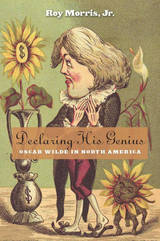
For a man who liked being called the American, Mark Twain spent a surprising amount of time outside the continental United States. Biographer Roy Morris, Jr., focuses on the dozen years Twain spent overseas and on the popular travel books—The Innocents Abroad, A Tramp Abroad, and Following the Equator—he wrote about his adventures. Unintimidated by Old World sophistication and unafraid to travel to less developed parts of the globe, Twain encouraged American readers to follow him around the world at the dawn of mass tourism, when advances in transportation made leisure travel possible for an emerging middle class. In so doing, he helped lead Americans into the twentieth century and guided them toward more cosmopolitan views.
In his first book, The Innocents Abroad (1869), Twain introduced readers to the “American Vandal,” a brash, unapologetic visitor to foreign lands, unimpressed with the local ambiance but eager to appropriate any souvenir that could be carried off. He adopted this persona throughout his career, even after he grew into an international celebrity who dined with the German Kaiser, traded quips with the king of England, gossiped with the Austrian emperor, and negotiated with the president of Transvaal for the release of war prisoners. American Vandal presents an unfamiliar Twain: not the bred-in-the-bone Midwesterner we associate with Huck Finn and Tom Sawyer but a global citizen whose exposure to other peoples and places influenced his evolving positions on race, war, and imperialism, as both he and America emerged on the world stage.

Arriving at the port of New York in 1882, a 27-year-old Oscar Wilde quipped he had “nothing to declare but my genius.” But as Roy Morris, Jr., reveals in this sparkling narrative, Wilde was, for the first time in his life, underselling himself. A chronicle of the sensation that was Wilde’s eleven-month speaking tour of America, Declaring His Genius offers an indelible portrait of both Oscar Wilde and the Gilded Age.
Wilde covered 15,000 miles, delivered 140 lectures, and met everyone who was anyone. Dressed in satin knee britches and black silk stockings, the long-haired apostle of the British Aesthetic Movement alternately shocked, entertained, and enlightened a spellbound nation. Harvard students attending one of his lectures sported Wildean costume, clutching sunflowers and affecting world-weary poses. Denver prostitutes enticed customers by crying: “We know what makes a cat wild, but what makes Oscar Wilde?” Whitman hoisted a glass to his health, while Ambrose Bierce denounced him as a fraud.
Wilde helped alter the way post–Civil War Americans—still reeling from the most destructive conflict in their history—understood themselves. In an era that saw rapid technological changes, social upheaval, and an ever-widening gap between rich and poor, he delivered a powerful anti-materialistic message about art and the need for beauty. Yet Wilde too was changed by his tour. Having conquered America, a savvier, more mature writer was ready to take on the rest of the world. Neither Wilde nor America would ever be the same.
READERS
Browse our collection.
PUBLISHERS
See BiblioVault's publisher services.
STUDENT SERVICES
Files for college accessibility offices.
UChicago Accessibility Resources
home | accessibility | search | about | contact us
BiblioVault ® 2001 - 2024
The University of Chicago Press









